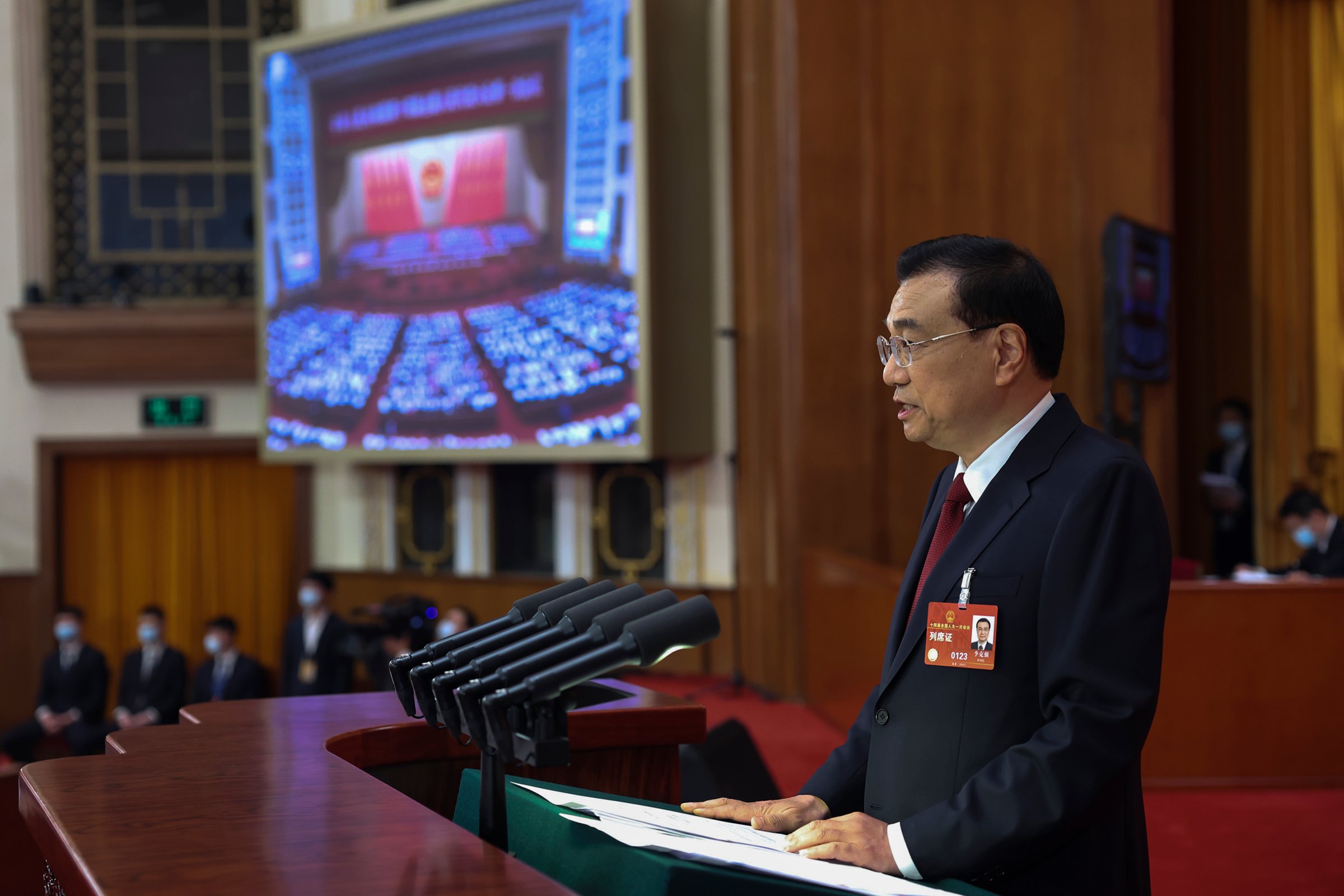
Given that Sunday was Premier Li Keqiang’s final Work Report to China’s annual rubberstamp parliament before retirement, you could forgive him for appearing more nostalgic than usual, lauding the government’s “truly momentous and remarkable” achievements over the last five years, such as lifting almost 100 million people out of poverty.
In fact, a total of 26 pages of the 32-page report concerned past successes, compared with only eight out of 30 pages last year. Some analysts believe Li’s focus on former glories suggests a lack of consultation with his successor regarding future plans. Others surmise that it means China’s near-term looks grimly uncertain. In any case, Li’s unveiling of an “around 5%” GDP growth target for 2023 was decidedly conservative, verging on pessimistic, though perhaps understandable amid confirmation that China achieved an expansion of just 3% last year, missing its target of 5.5%. (Li’s first Work Report back in 2014 set a growth target of 7.5%.)
Still, a refocus on the economy does make sense. The early success of China’s zero-COVID policy compared to the rest of the world gave President Xi Jinping a lot of space to pursue politically motivated, strategic goals at the expense of growth. And Xi used it to crack down on everything from tech monopolies to a runaway real estate market and even after-school tutoring. But a stalling of the economy as zero-COVID faltered led to rocketing youth unemployment, which has climbed steadily to around 20% today. On Sunday, Li told Beijing’s cavernous Great Hall of the People that the government’s top priority for 2023 was “economic stability” by boosting domestic demand and creating another 12 million urban jobs. Tellingly, Xi’s signature policy of “common prosperity” didn’t appear at all.
“So what we’re starting to see is a backing off from some of those political goals … and trying to get the economy moving back in the right direction,” Jacob Gunter, a senior economics analyst at the Mercator Institute for China Studies, told a press briefing.
But it’s unclear whether dialing back politics is even possible in Xi’s China. At last October’s Chinese Communist Party Congress, Xi installed staunch loyalists into his inner circle while assuming a protocol-breaking third leadership term. In 2019, he even changed the CCP’s evaluating criteria for leading cadres so that the very first is commitment to his eponymous political thought. It has contributed to a cult of personality not seen since Mao Zedong.
However, during a speech on March 1 to mark the opening of the CCP Central Committee School’s spring semester, Xi expressed dissatisfaction with officials who overdo directives to trumpet their political loyalty or virtue-signal. Instead, he called for more professionalism among the rank and file. “Leading officials must improve their capabilities in all respects, strive to be highly proficient in their work, and make constant efforts to enhance their professionalism to be more competent,” Xi said.
Whether Xi is truly willing or able to soften his ideological urges for economic expediency is anyone’s guess. Economists believe that this year’s modest growth target is eminently achievable following the dismantling of zero-COVID. Still, household consumption in China remains low—under 40% of GDP, compared to around 60% in high-income economies—and Li proposed 3.8 trillion yuan ($550 billion) for special-purpose local government bonds to help raise it. Efforts to boost consumption are being undermined by contradictory political imperatives, such as fostering technological self-reliance, with capital pumped into strategic industries rather than lessening the burdens of working families.
“Consumers just don’t make decisions based on the strategic technology goals of Beijing,” says Gunter. “They don’t care whether the polymers that go into their laptop or cellphone or car are coming from a German chemical company or a Chinese chemical company.”
In foreign policy, too, politics threatens to upset economic goals. Li announced that defense spending would rise by 7.2% in 2023, which is the fastest pace since 2019 amid increasing tensions with the U.S. on myriad issues, not least the status of Taiwan, the self-ruling island which Beijing claims as its sovereign territory. “Uncertainties in the external environment” are “on the rise,” Li told delegates. “External attempts to contain and suppress China are escalating as well.”
Still, since the CCP’s stated deadline for military modernization by the People’s Liberation Army centenary in 2027 is fast approaching, few analysts are surprised by the hike. Meanwhile, the softer tone in Li’s Work Report to “promote the peaceful development of cross-Strait relations and advance the process of China’s peaceful reunification” with Taiwan seems to indicate an invasion isn’t foremost on the agenda. “The overtone seems to be one of patience and incremental progress rather than a rush for achieving quick results on Taiwan,” says Wen-Ti Sung, a scholar specializing in Chinese elite politics at the Australian National University.
But once again, that all depends on putting politics on the backburner—which is a huge question mark under Xi. On Wednesday, the U.S. approved the sale of an additional $619 million of arms and equipment to Taiwan, prompting China to send 21 combat planes flying into the island’s airspace. For all the talk of focusing on the economy, there’s little sign that a newly emboldened Xi—surrounded by lackeys and sycophants—is going to back down on his key policy priorities to make it happen.
“Perhaps Xi can feel much more comfortable in terms of getting the bureaucracy to do his bidding,” says Sung. “But there’s also the echo chamber effect which makes it harder to receive constructive criticism and feedback.”
More Must-Reads from TIME
- How Donald Trump Won
- The Best Inventions of 2024
- Why Sleep Is the Key to Living Longer
- Robert Zemeckis Just Wants to Move You
- How to Break 8 Toxic Communication Habits
- Nicola Coughlan Bet on Herself—And Won
- Why Vinegar Is So Good for You
- Meet TIME's Newest Class of Next Generation Leaders
Write to Charlie Campbell / Singapore at charlie.campbell@time.com